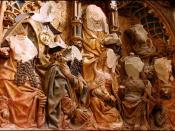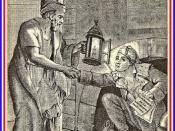This paper is intended to contain the analysis of the human cultural identity, as seen in
the following five historical cultural periods: Enlightenment Culture; Greco-Roman
Culture; Judeo-Christian Culture; Renaissance-Reformation Culture; and
Industrialization-Modernism Culture. It also embodies examples of each era that are
clearly stated, and how they relate to the cultural period.
The cultural identity of the Enlightenment can be described as emphasizing the
possibilities of human reason. This idea can be illustrated with such examples as Thomas
Jefferson, Denis Diderot, and Protestantism. Thomas Jefferson was considered among
one of the most brilliant American exponents of the Enlightenment culture. He had the
time and the resources to educate himself in many topics including history, literature,
law, architecture, science, and philosophy. He had the motivation and the connections to
apply Enlightenment political philosophy to nation-building. Denis Diderot was a French
encyclopedist and philosopher, who also composed plays, novels, essays, and art.
He
greatly influenced other Enlightenment thinkers with his translations of Encyclopedie ou
dictionnaire raisonne des sciences, des arts et des metiers, usually known as
Encyclopedie. He used this translation as a powerful propaganda weapon against
Ecclesiastical authority, and the semifeudal social reforms of the time. Protestantism is a
good example also. It is one of the three major divisions of Christianity. It displays the
release of traditional religion and the movement to worldly learning and the rise of
protests against the controlled way of expressing one's self. It allows the human himself
to reason out the way that he thinks, instead of an authority telling him how to do so
therefore, extending his mind.
The Industrialism-Modernism culture is a culture that represents social, economical,
and scientific advancement, as well as self-doubt, uncertainty, and alienation. These
traits can be characterized with such examples as Werner Heisenberg, Epicureanism, and
Eli Whitney...



Hmm
Interesting essay. Next time maybe you should consider single-spacing to make it easier to read...
2 out of 2 people found this comment useful.